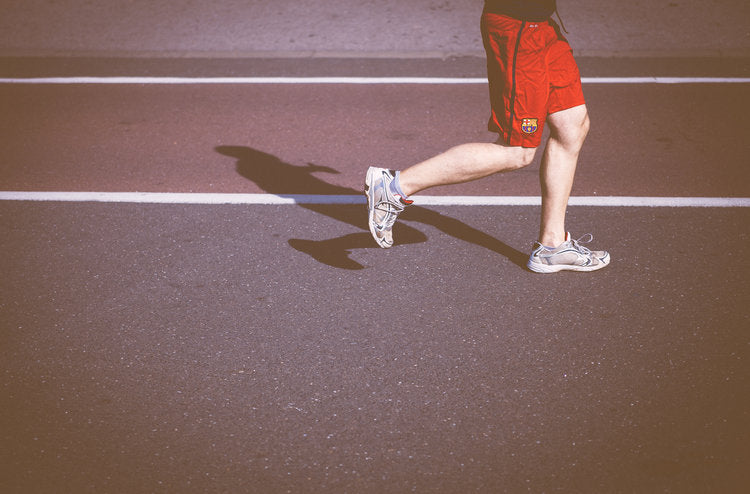
Have Itchy Legs When Running? It's Called Runner’s Itch.
You’ve laced up your running shoes. You start a fast-paced walk that soon turns into a light jog on this beautiful summer morning. Ten minutes into your jog, you pick up the pace and get a nice, smooth stride going. The breeze is in your hair, your heart beats faster, and… your legs get an itchy feeling.
Hmm.. this is new and different. Perhaps you even stop your run to look around for a plant or tree you’re allergic to. You begin to wonder what’s going on in your body that’s causing this extreme allergic reaction. You may even scratch your legs, which causes red excoriations on your thighs. Ouch.

Why do your legs itch when running?
There can be multiple reasons why this is happening. Perhaps you have skin sensitivities to lotions or detergents. You may have exercise-induced urticaria, which is accompanied by hives. But most of the time, what you experience is called runner’s itch.
This itch occurs when capillaries and arteries expand in your legs due to increased blood flow and heart rate, resulting in swelling. When this itchy sensation occurs, the brain reads this opening of the capillaries as itchiness.
Research suggests an influx of histamine released during exercise to protect against fatigue, which can cause the expansion of blood vessels in the body, which causes the brain to read the sensation as itchiness in the nerve cells.
When you begin to feel itchy legs, most people misidentify this sensation as an allergic response because this is what they’ve been taught happens when exposed to allergens. But this can solely be a result of the brain’s response to the opening of capillaries and increased histamine.
Now we understand that we are not allergic to exercise. And, if you continue to run through the itch, your legs will, in turn, stop itching because the brain acclimates to the opening of the capillaries and improved circulation. And, the more often you run, the less likely you will experience this uncomfortable sensation, especially if you make regular exercise a part of your routine.

It started out with an itch; how did it end up like this?
The phenomena of runner’s itch, also known as exercise-induced itch, had me thinking about what else the brain misidentifies as a sensation. Another example of this is pain. Pain is not always a direct measure of tissue health. Pain is a warning signal from the brain that something is not right.
This could be an acute injury, which means the pain will subside after treatment. If the pain becomes persistent, this means there’s an underlying issue that should be addressed. This does not make the pain any less real, nor does it make the itchiness less. The brain can also tell the rest of your body to experience symptoms like fatigue, brain fog, food sensitivities, and chemical sensitivities in an inappropriate way.
When you experience multiple symptoms or sensitivities, it may not be a result of exposure to specific allergens. Rather, it can be the brain responding in hyper-drive, survival mode, or the sympathetic nervous system response. Understanding the causes of runner’s itch is crucial in properly addressing and managing this sensation.
When operating from this response, the brain can perceive all potential threats as dangerous. That lotion you’ve been using for 10 years- dangerous. Those cotton clothes you’ve worn all your life- dangerous. That chai tea that you enjoy in the mid-morning- dangerous. Danger, danger, danger! Your world begins to shrink.
The bubble you typically operate in becomes smaller and smaller until you find yourself wearing one brand of clothing, drinking only water, and eating grilled chicken for breakfast, lunch, and dinner. You’re no longer socializing with friends because you’re afraid of what perfume they’ll wear or whether the noise in the restaurant will be too loud.
You no longer exercise because in the past, you were fatigued for the next 3 days after you walked around your neighborhood. You told your spouse that there is NO way you’re getting a puppy because of the potential allergens it can expose. Does this sound familiar?
You can change your brain
We now know that we have the conscious decision to change our brains. Sometimes, our brains get stuck in a chronic state of the sympathetic response, and that’s OK. It’s trying to protect us in a way. But it’s also extremely comforting to learn that we can override the brain’s initial response. It’s a bewildering thought, yes. But we can change our sensitivities and symptoms once we learn how to do this. We can look at our itchy legs in a whole new light
It’s time to look at the brain
There is a term used in psychology called meta-cognition. Meta-cognition means that we, as humans, have an innate ability to become aware of our own thought processes. And we’re the only animals that have this ability! So next time you’re beginning to go down that rabbit hole of asking yourself WHY you’re experiencing your symptoms or WHY you have itchy legs after running, it’s time to catch yourself experiencing that thought. And once you do, you can:
Say aloud, “That’s my sympathetic response!”
Take a deep 5-second inhale and a deep 5-second exhale.
Then, smile. :)
It may seem simple, but it’s a small exercise to start out with. You can complete this regularly 15-50 times a day each time you want to acknowledge that a symptom you’re experiencing results from your brain misidentifying a sensation. When we commit to practicing an exercise like this regularly, we begin to change the neural structures in our brains, making changes to the symptoms we experience daily.
So, simple, yes… but effective.
FAQs about Runners Itch
How long do runners itch last?
Runner's itch varies in duration based on the individual and cause. Typically temporary, it can last from a few minutes to hours post-exercise. It often resolves as the body cools down and blood flow returns to normal. Consult a healthcare professional if itching persists or is accompanied by other symptoms.
Who’s most prone to runner’s itch?
Runner's itch, also known as "exercise-induced itching," can affect anyone who engages in physical activities, especially running. However, individuals with sensitive skin or those who sweat excessively are more prone to experiencing runner's itch. Additionally, wearing tight clothing or using certain fabrics that can cause skin irritation, such as synthetic materials or harsh laundry detergents, can increase the likelihood of developing this uncomfortable sensation. If you are experiencing runner's itch, it may help to wear loose-fitting clothes, stay hydrated, and moisturize your skin regularly to reduce the irritation caused by sweating during exercise.
Is runner's itch a common issue among athletes?
Runner's itch is a common issue among athletes, particularly runners. It is characterized by a tingling or itching sensation that occurs during or after physical activity, usually on the legs or arms. Runner's itch is typically caused by increased blood flow to the skin during exercise, which can trigger nerve endings and result in the sensation of itching.
While runner's itch is generally harmless and usually subsides on its own, some strategies can help alleviate symptoms, such as wearing loose-fitting clothing, staying hydrated, and taking antihistamines if needed. If runner's itch persists or is accompanied by other concerning symptoms, such as inflammation, it is always a good idea to consult with a healthcare professional for further evaluation and advice.

